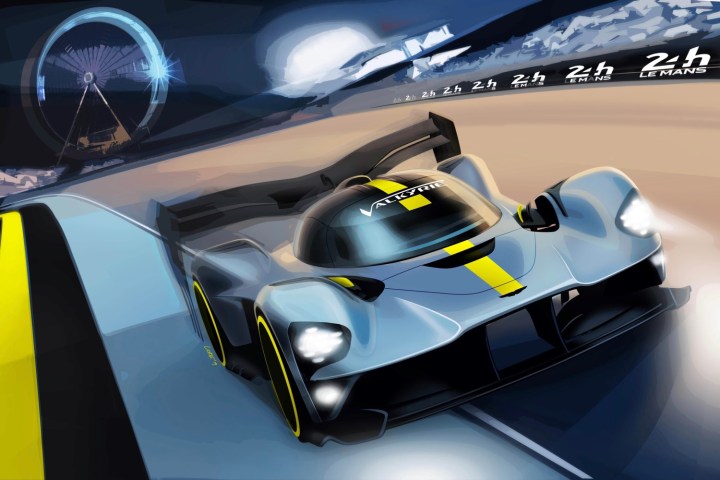
Aston Martin claims its upcoming Valkyrie hybrid hypercar will set a new performance benchmark, but that’s easy to say when your new car is destined to be nothing more than a rich person’s plaything. Aston is putting its money where its mouth is, however. The Valkyrie will race at the 24 Hours of Le Mans in 2021 as Aston aims for its second overall win in the legendary French race.
Aston Martin Vantages currently race at Le Mans, but only in a lower-level class that doesn’t allow the British automaker to challenge for outright victory. Aston’s only overall win came in 1959 with the DBR1. The automaker has tried, and failed, numerous times to achieve a repeat victory. Aston believes new rules will give it a decent shot in 2021, which also happens to be the 100th anniversary of the automaker’s Le Mans debut.
Under the current rules, the top class of Le Mans is composed of purpose-built hybrid race cars. It previously featured Toyota, Audi, and Porsche, but the latter two dropped out, leaving Toyota uncontested. That’s pretty boring, so organizers drafted new rules in order to attract more teams. These so-called “hypercar” rules call for racing derivatives of the world’s fastest road cars, according to Aston. With so many automakers working on insane hypercars, now is as good a time as ever to build a class of race cars around them.
The Valkyrie already has plenty of racing DNA. It’s the product of a partnership between Aston and the Red Bull Racing Formula One team. Red Bull’s Adrian Newey, one of the most successful designers in F1 history, penned the Valkyrie in concert with Aston’s in-house design team. Powered by a 6.5-liter V12 with electric assist, and featuring radical aerodynamics, Aston has said the Valkyrie will be able to match the performance of some current race cars on the track.
Aston plans to make two versions of the Valkyrie: A road-legal model, and an AMR Pro version that will be for racetracks only. Just 25 Valkyries will be built in total, with deliveries expected to begin in 2020. It remains to be seen whether organizers can convince enough other automakers to enter their own hypercars at Le Mans when the Valkyrie makes its racing debut in 2021.
Editors' Recommendations
- Aston Martin’s first SUV will share an engine with its sports car siblings
- Ford says au revoir to the 24 Hours of Le Mans with retro GT liveries


